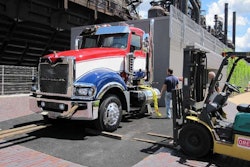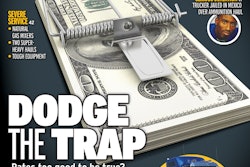Denver-based independent Tom Koller wrote in with some commentary germane to the broker bond increase, at once taking issue with a perceived lack of letters to the editor in Overdrive.
On the latter score, Tom, we do in fact publish letters to the editor on the Speakout page of the mag (here’s June’s, and here’s the previous month’s), and commentary from readers is often a substantial part of the Roadside Attractions section in the front of the magazine. We realize we don’t do enough of it, though. As of August, we’ll have a new front-of-the-book section devoted more expansively to owner-operator voices, so keep an eye out for it.
And readers, here’s Koller’s note about my “Beefing Up the Bond” story about the broker surety minimum increase proposal in this month’s issue, as well as a fuel-mileage tip:
Here’s a couple of comments on June issue: Computer devices to drive the truck are nice and so are aerodynamic fairings and side skirts, etc., but the best way to get good mileage is to simply slow down — 62 mph is a good overall speed and one I rarely exceed.
And as for crooked brokers, there aren’t that many of them and none have legitimate customer-shippers. I always look to the identity of the shipper because this is where the ultimate responsibility to pay originates. A freight broker is merely an agent for the shipper. There is a federal case — Oak Harbor Freight Lines v. Sears Roebuck and Co. 42 F.Supp 1138 (2008)
— which states that a shipper is ultimately responsible for paying the trucker, even if the broker has been paid. Once these shippers find out they can be forced to pay twice for the same service close attention is paid to whom they give their business.

So if I don’t know a broker and the shipper is also an unknown, I just pass on the load.
Tom Koller, Denver
Thanks for the tips, Tom.
For more reading about the Oak Harbor case Koller mentions, check out this long explanation of it from the Transportation Intermediaries Association — keep in mind its written for their broker members.











